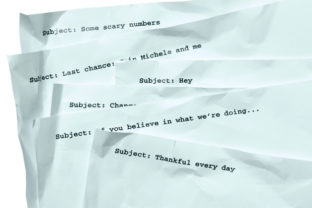My Last Email
No, I’m not about to quit. But, when the message popped up in my inbox from Sen. Amy Klobuchar with the subject line reading “My last email” I initially thought she was throwing in the towel.
Not so. She was simply noting that this was her “last email before the first FEC deadline of this presidential campaign” and she really needed my contribution to bulk up her fundraising numbers for that period.
In politics as in fundraising for other sectors the subject line is important. It can inform…or intrigue…or mislead. As the 2019 presidential election campaign heats up my hybrid DNA as part political junkie/part copywriter is aroused and alert. Thus, this post.
 Back in the 2012 presidential cycle Tom and I occasionally reported on marketing/fundraising lessons from those campaigns. As I look at the 2019 emails flooding my inbox I can’t help but recall a post by Tom titled Hey! reported on the herculean effort of the Obama campaign team to test subject lines.
Back in the 2012 presidential cycle Tom and I occasionally reported on marketing/fundraising lessons from those campaigns. As I look at the 2019 emails flooding my inbox I can’t help but recall a post by Tom titled Hey! reported on the herculean effort of the Obama campaign team to test subject lines.
The effort paid off. By the end of that campaign the Obama digital team, which included 20 writers alone (!) had tested every aspect of each proposed email appeal before committing to mass distribution—often as many as 18 variations before picking a winner. (For a fascinating read on the process check out The Science Behind Those Obama Campaign E-Mails— from Bloomberg Businessweek.)
The result was $690 million raised online.
Among the winners from the best 15 Obama campaign subject lines was the single word: “Hey!” (See all 15 of the ‘best’ here.) And when Tom tested that as a headline against other headlines for hisAgitatorpost that single word emerged the winner.
The point is that when the experts urge you to test—whether envelopes, letters, telemarketing scripts or email subject lines it’s advice you should take to heart.
More than direct mail teaser copy, letter or telemarketing scripts the subject line of an email is far easier to test—even for smaller organizations. There are numerous free services that enable you to quickly—and free or inexpensively—run that test. You’ll find some of them here, here, and a dozen more here.
A few words ofwisdom, experience,observation on types of subject lines and their pros and cons:
- Single Word Subject Lines.A word like “Hey”, “Bump”, “Wow” is generally safe and has the advantage of mimicking a text message. Pioneered and tested by the Obama campaign the single word is back in 2019 and can be expanded to appear like…
- …A work-related or personal subject line. As in John Hickenlooper’s “Wanna grab a beer?” or Kirsten Gillibrand’s “Quick thing for this a.m.” or “Checking on this?” or “Hey there. Can you text me?”
- The Perplexing Subject Line. Like good teaser copy on a direct mail outer envelope a mysterious-sounding line may boost the open rate. Slatereports these two beauties: The first from Beto O’Rourke’s campaign with the subject line “Banquet hall tilapia”—which in the words of Slatereporter Aaron Mak “is obviously a click for anyone curious what the candidate’s platform has to do with pescatarian dining options. (It turns out the phrase was taken from a line from the former congressman about how democracy “shouldn’t be about whichever candidate can invite the most lobbyists to eat banquet hall tilapia for $2,800-per-plate.”)
“Bernie Sanders’s campaign also sent an email with the subject line “This is the antichrist”(click!), which raises a million questions about the senator’dbranding strategy until you read the full text and see that it’s quoting an attack from one of his moneyed critics.”
- The Audacious/Deceptive Subject Line. Given the flood of emails competing for our attention it’s sometimes tempting to compete by going over the top. For example, an editor at Slate“assumed that someone had replied to one of his emails because the “from” line read, “Rachel, me (2).” When he opened the email, however, he discovered that “Rachel, me (2)” was actually just a phony name that the Democratic fundraising group Act Blue and Sen. Jeanne Shaheen’s campaign were using to make it seem like part of an ongoing thread.” The New Hampshire senator’s campaign did not reply to Slate’s request for comment.
So, think, think, think. Test. Test. Test.
AND…this was definitely not “my last email” to you.
Roger
P.S. If you’re a political fundraising junkie and are interested in how each if the 2020 Democratic candidates are doing check out this detailed report from FiveThirtyEight . In it you’ll find the candidates’ totals through the 2nd quarter and an interesting analysis explaining why fundraising numbers may–and may not– matter.



[…] you forgetting the most important thing in your email messaging? My Last Email. Also from The […]
Words of caution: If a subject line wins (say the one-word version), it doesn’t mean you should use that strategy over and over again. The effect can easily wear off over time. Save it for when you have a really important email or campaign to share.
This week’s article and discussion from Email on Acid included expert insights about the important combination of subject line, sender name, and preview text. https://www.emailonacid.com/blog/article/email-marketing/the-art-and-science-of-from-fields/
It’s time we pay attention to more than the subject line – let’s think carefully about our sender names and preview text too. None of these live in isolation in your inbox.